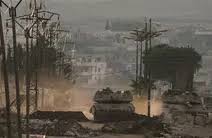Tensions are mounting in the Middle East as Israel expresses growing concern over a potential alliance between Turkey and Syria, just as regional diplomatic voices urge the newly formed Syrian government to commit to international norms and assure its neighbours of peaceful intentions.
According to an exclusive report by Haaretz, a senior Israeli official revealed that Turkey is actively working to reduce Israel’s operational freedom in Syrian airspace. These revelations come as Israeli Prime Minister Benjamin Netanyahu prepares for a high-level security meeting—his second in a week—to assess what his office has described as “Turkey’s increasing influence” in Syria.
Netanyahu Warns of Confrontation in Syria
Netanyahu reportedly warned in recent consultations that a direct confrontation with Turkey on Syrian soil is becoming a real possibility. Israeli media outlets have amplified this message, quoting Netanyahu’s advisers as encouraging the portrayal of such a clash as “inevitable,” particularly in light of shifting dynamics following the fall of the Assad regime.
Concerns in Tel Aviv are especially acute regarding Turkish activities near Palmyra (Tadmur), in central Syria. Reports suggest ongoing discussions between Ankara and Damascus over a possible Turkish military presence in that area, potentially in exchange for economic and military support to the new Syrian administration.
Growing Fears over Southern Syria and the Golan
Israeli intelligence believes that Syria’s new government is working to restore military installations and missile systems in the country’s south—moves seen as threatening to Israeli security, especially if they are part of a coordinated Turkish–Syrian strategy.
A recent Israeli government report even recommended that the country prepare for a possible military confrontation with Turkey, underscoring fears that such an alliance could shift the balance of power in southern Syria and the occupied Golan Heights.
Egypt Calls for Syrian Reassurance
Amid these rising tensions, Arab diplomacy is calling for a more measured and conciliatory approach. In an article published in Independent Arabia, former Egyptian Foreign Minister Nabil Fahmy urged Syria’s new leadership to send clear messages of reassurance to neighbouring countries. He emphasised that Damascus should publicly commit to respecting the sovereignty and territorial integrity of others, and adhere strictly to international law.
Rebuilding Syria Through Inclusion and Reform
Fahmy stressed that Syria’s transition must be led by Syrians themselves, and that it is not a question of choosing between remnants of the old Assad regime or extremist groups, but rather responding to the Syrian people’s aspirations for a more inclusive and just future. He called for a formal declaration affirming Syria’s commitment to rebuilding its institutions in line with international norms and the UN Charter.
This, he argued, should be accompanied by preparations for a national conference representing all segments of Syrian society—an essential step to ensure that the political process is inclusive, transparent, and grounded in principles of justice and equal representation.
Sharaa’s Government: A Pledge for Change
Echoing these sentiments, Syria’s newly inaugurated president, Ahmad Al-Sharaa, described the current moment as a “historic juncture” during a recent address announcing his new cabinet on 29 March 2025. He underscored the government’s commitment to fighting corruption, reforming key sectors like energy, healthcare, and education, and attracting skilled Syrian professionals from abroad.
Al-Sharaa also introduced new ministries—including Youth and Sports, and Emergency and Disaster Response—to address the evolving needs of the country, branding his administration as one of “change and reconstruction.” He reiterated that collective action and national unity would be essential in building a modern, resilient Syria.
A Call for Engagement, Not Isolation
Fahmy concluded that success in Syria’s transition hinges on rebuilding trust with the international community and actively engaging in regional cooperation. This, he noted, includes defusing historical tensions and laying the groundwork for economic recovery and long-term stability.
As regional alliances evolve and new power dynamics emerge, the Syrian file remains at the heart of a volatile equation. While Israel fears strategic encirclement and prepares for worst-case scenarios, Arab states are calling for a balanced approach—urging Damascus to choose diplomacy over confrontation and reintegration over isolation.
This article was translated and edited by The Syrian Observer. The Syrian Observer has not verified the content of this story. Responsibility for the information and views set out in this article lies entirely with the author.


